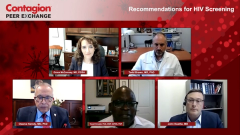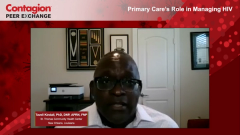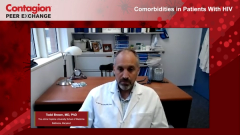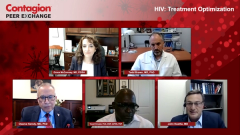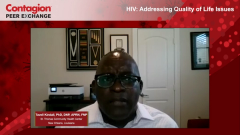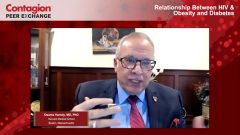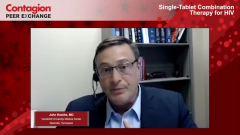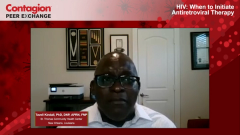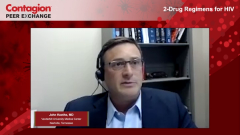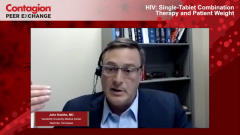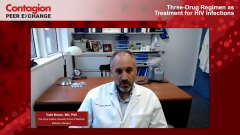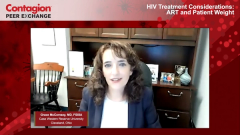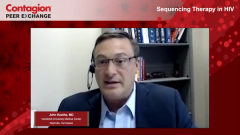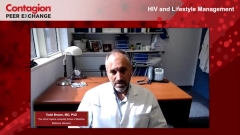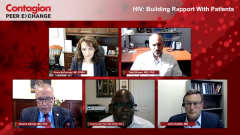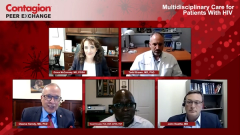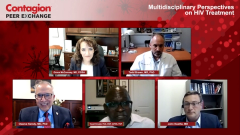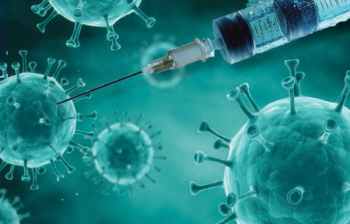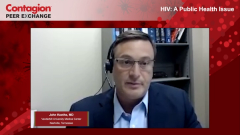
HIV and Lifestyle Management
Lifestyle management interventions that can help patients with HIV on antiretroviral therapy manage their weight.
Episodes in this series

Grace McComsey, MD, FIDSA: Osama, do [lifestyle changes] make a difference? Do people listen?
Osama Hamdy, MD, PhD: Definitely. People who are already contemplating and would like to lose weight, they usually can lose weight. But most importantly, we must understand the fundamentals of weight loss, because when people just go on a dietary plan, like in a commercial, they may lose weight and gain weight back because they lose muscle mass. One of the major points in weight loss is to maintain as much of the muscle mass as you can. I’m glad I heard John saying that they are evaluating body composition and know exactly what’s going on. In general, people beyond the age of 40 lose around 8% of their muscle mass every decade. By the age of 70, they lose around 15% of their muscle mass every decade. Between 40 and 70, people already lost 24% of their muscle mass. When they lose muscle mass, energy expenditure goes down, basic metabolic goes down, and they gain the weight back again. If you would like to implement an efficient weight management program, you’ll need to keep an eye on maintaining muscle mass.
One approach for weight management is not enough. You need dietary intervention, exercise intervention, behavior modification, and an adjustment of medications. For example, with diabetes medications, if you have someone with HIV [human immunodeficiency virus] on a medication that causes weight gain, and that person is also on pioglitazone, insulin, or a sulfonylurea, the weight gain will be doubled. Sometimes we adjust the medications that cause weight gain, like a SGLT2 [sodium-glucose cotransporter-2] inhibitor and GLP-1 [glucagon-like peptide 1] receptor agonist. Now GLP-1 receptor agonists are approved to be used for obesity, even without diabetes. But dietary intervention is important. We now know that the most modifying factor in weight gain and help in weight control is to cut down carbohydrates. We usually tell people to cut their carbohydrates lower than 40%, increase the amount of protein, and more strength exercise. That’s important to keep muscle mass up. A multidisciplinary program works well. District programs are working well. Coaching during weight management is efficient because we always love to see someone that is accountable and observe and encourage them. There are many other tips for weight management we can discuss in detail, if you would like.
Grace McComsey, MD, FIDSA: Perfect. Good advice for patients.
Todd Brown, MD, PhD: One thing I want to add—and this is something that I talk to patients about in the clinic—patients who are, say, 40 lbs overweight, let them know that they don’t have to lose 40 lbs in order to realize metabolic benefit. If they were to lose 5 lbs to 10 lbs, or 5% to 10%, they will start to see some of the metabolic benefit. That is an important message to tell patients because it’s less overwhelming. They think, “I can lose 10 lbs. That’s not a problem.” Whereas if its 40 lbs, they may feel overwhelmed.
Osama Hamdy, MD, PhD: Almost 20 year ago, our research showed that when people lose just 7%, insulin sensitivity improves by 57%. Every 5% weight loss will reduce blood pressure by 5 mm Hg. The risks for development of diabetes significantly lowers, and improves the dyslipidemia, which is also common in patients with HIV.
Grace McComsey, MD, FIDSA: You mentioned GLP-1 receptor agonists. I want to point out, for the audience, we have 2 ongoing studies in HIV looking at GLP-1 receptor agonists, but we don’t have any data yet. I would think about waiting for these studies before broad use in HIV, but they look good in the general population.
Thank you for watching this Contagion® Peer Exchange. If you enjoyed the content, please subscribe to the e-newsletter so you can receive upcoming Peer Exchange segments and other great content. Thank you for listening.
Transcript Edited for Clarity
Newsletter
Stay ahead of emerging infectious disease threats with expert insights and breaking research. Subscribe now to get updates delivered straight to your inbox.

